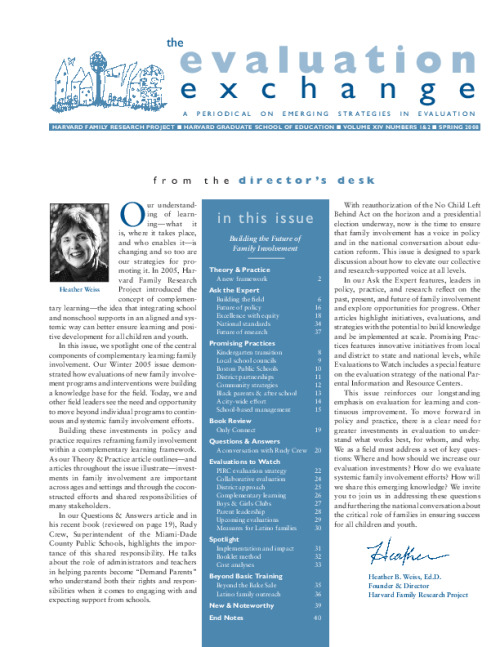Downloads

rubio_evaluation_exchange.pdf
PDF | 562.19 KB
We examine a program that involves parents directly in the management of schools located in highly disadvantaged rural communities. The program, known as AGE, finances parent associations and motivates parental participation by involving them in the management of the school grants. Using a combination of quantitative and qualitative methods, we show that the AGE increased the participation of parents in monitoring school performance and decision-making. Further, we find that AGE improved intermediate school quality indicators, namely grade failure and grade repetition, controlling for the presence of a conditional cash transfer program and other educational interventions.
Authors

Research Associate
Marta is a Research Associate, working at the Centre for Evaluation of Development Policies at IFS and at the Inter-American Development.

UC Berkeley

Harry Patrinos
Report details
- Publisher
- Harvard Graduate School of Education
Suggested citation
P, Gertler and H, Patrinos and M, Rubio Codina. (2008). Empowering parents to improve education: evidence from rural Mexico. London: Harvard Graduate School of Education. Available at: https://ifs.org.uk/publications/empowering-parents-improve-education-evidence-rural-mexico (accessed: 4 May 2024).
Related documents
More from IFS
Understand this issue

Where next for the state pension?
13 December 2023

Social mobility and wealth
12 December 2023

Autumn Statement 2023: IFS analysis
23 November 2023
Policy analysis

Recent trends in and the outlook for health-related benefits
19 April 2024

Progression of nurses within the NHS
12 April 2024

Regional variation in earnings and the retention of NHS staff in Agenda for Change bands 1 to 4
10 April 2024
Academic research

A senior doctor like me: Gender match and occupational choice
24 April 2024

Police infrastructure, police performance, and crime: Evidence from austerity cuts
24 April 2024

Imagine your life at 25: Gender conformity and later-life outcomes
24 April 2024